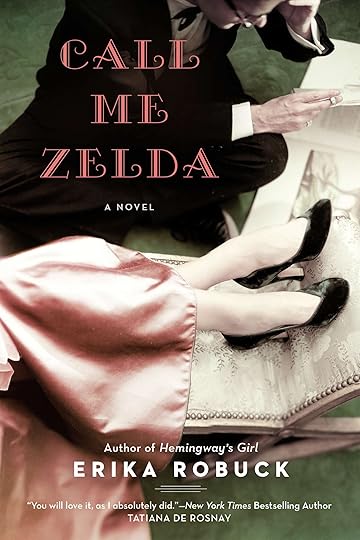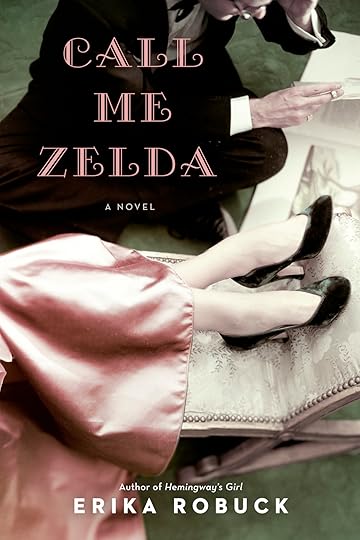Erika Robuck's Blog, page 18
April 11, 2013
NPR Visit and The Annapolis Book Festival
I had the great pleasure of visiting Baltimore’s NPR affiliate, WYPR, Maryland Morning with Sheilah Kast, to discuss my new novel CALL ME ZELDA, and my upcoming appearance at the Annapolis Book Festival. To listen, click here.
The Annapolis Book Festival is this weekend at the Key School. I will be a part of a panel discussion on Saturday, April 13th at 10:30 a.m. with The Book Maven, Bethanne Patrick, and novelists Caroline Leavitt and Christoper Tilghman. For a full schedule of events at the book festival, click here.
I hope to see you in Annapolis!


April 8, 2013
Count Down to Book Launch…
My new novel, CALL ME ZELDA, will be published on May 7th by NAL/Penguin. It begins in Baltimore in 1932 when Zelda Fitzgerald checks into the Phipps Clinic at Johns Hopkins, and takes place during the aftermath of the Fitzgerald party years. Through Zelda’s relationship with a fictional psychiatric nurse, the book explores the meaning of friendship, love, and how we heal from emotional injury.
CALL ME ZELDA is a book that I’ve held close to my heart for a long time, inspired by my fascination with F. Scott and Zelda Fitzgerald, and by the nurses I’ve known in my life (grandmother, mother-in-law, aunt, sister-in-law, friends…), who give so much of themselves to their patients. It also comes from my compassion for those who suffer mental illness and post-traumatic stress disorder, the ways they are often misunderstood, and the pain of the family members caring for them.
It is the first novel I’ve written in the first person point of view, and as a writer, that takes one very deeply into the heart and mind of the characters, for better or worse. There is an intimacy, an immediacy to first person, and this novel marks my maiden voyage of many, I think, into this point of view.
There are links on my website to pre-order CALL ME ZELDA, if you are so inclined. If you read the book and enjoy it, I invite you to post a review at your favorite online book site. My website also has listings of my upcoming book tour and festival appearances. I hope to see you on the road!


April 3, 2013
Audiobook Giveaway

I’m delighted to present the audiobook of my novel HEMINGWAY’S GIRL. The narrator is critically acclaimed Tavia Gilbert, the talented voice artist who has covered many titles, including Mary Sharatt’s ILLUMINATIONS.
In honor of the audio publication date, I’ll be giving away one copy of HEMINGWAY’S GIRL to a commentor on the blog. For a chance to win, please tell me your favorite audiobook. If you’ve never listened to an audiobook, let me know. I will be honored if HEMINGWAY’S GIRL is your first.
The contest runs through Friday, April 5th, at 10 PM EST. (U. S. residents only~my apologies…) Please share on social media, and thanks so much for participating!
Hemingway’s Girl on Audio at:


April 2, 2013
Book Review: THE LAST TELEGRAM
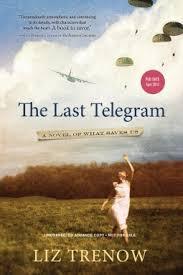
“I send up a silent prayer that she will never know the dreary fear of war, when all normal life is suspended, when the impossible becomes ordinary, when every decision seems to be a matter of life or death, when good-byes are often for good.” Liz Trenow, THE LAST TELEGRAM
THE LAST TELEGRAM published today and is 347 pages. I was sent a galley for review consideration from the publisher because of my interest in historical fiction.
The novel begins in the present day at the funeral of Lily Verner’s husband, a man to whom she has been married for decades. When the elderly widow’s granddaughter discovers a trunk of letters, photographs, and old papers, Lily suddenly finds herself lost in memories of the past…
In the summer of 1938, Lily is a vivacious, headstrong young woman living on the grounds of her family home and her father’s lucrative silk mill in the British countryside. As the war begins, her life becomes fraught with uncertainty. Her family takes in three Jewish German young men who have been relocated for their protection to work in the mills with the family, where they fulfill a new contract to create parachutes for the military. As the war looms closer to home and discoveries of love are made, Lily is put under tremendous strain. Decisions she makes in her business and relationships have long lasting consequences, and she wonders if she can ever heal from the pain of that time.
I’m a regular reader of WWII novels, and I’m endlessly interested in the portrayal of different people and places affected by the war. THE LAST TELEGRAM is yet another fascinating look at this terrible time in human history, with memorable characters, a compelling plot, and bittersweet satisfaction.
Fans of THE POSTMISTRESS or THE SOLDIER’S WIFE, will enjoy THE LAST TELEGRAM. It is an engaging and evocative debut, and I look forward to reading more by Liz Trenow.


March 22, 2013
Author Interview: Anita Hughes
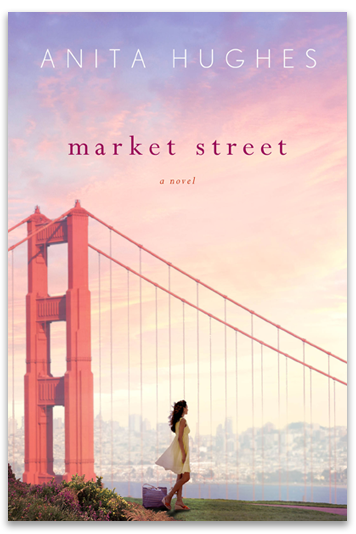
Last year I had the pleasure of reading MONARCH BEACH, and fell in love with Anita Hughes’ smart, engaging style. Now Anita has released MARKET STREET, a story of friendship, betrayal, and love that NY Times bestselling author Karen White calls “a love letter to San Francisco.” Anita was kind enough to answer my author interview questions, and now I want to read the book even more.
1. What inspired you to write your novel?
I love San Francisco – the city, the people, the food, and I wanted to write a novel about the city. I also love books about female friendships and I am extremely fond of my main character and her best friend. They make me laugh out loud.
2. What is your favorite part of the writing process?
I love sitting down to my computer and just writing. Once I find my rhythm I am completely transported, I forget time and place and just write.
3. What part of the process is not your favorite?
Sometimes I get a couple of new ideas at the same time and I’m not sure what to write next. I get really torn because once I start there’s no turning back. I feel quickly responsible for my characters and need to take care of them.
4. If you could go back in time, what would you have told your unagented/ unpublished writing self?
To really enjoy the writing – it is the best part of the process – just you, the computer and the stories in your head.
5. What is your favorite novel of all time?
Of Human Bondage by Somerset Maugham – I have read all his work and it has taught me so much.
6. What is your first memory of writing?
When I was eight years old, I won a national writing contest in Australia. That was unexpected and very thrilling. I was hooked.
7. What do you most want readers to take away from your novel?
I’d like my readers to laugh, smile and feel good when they finish Market Street.
If you’d like to learn more about Anita, check out her website: http://anitahughesbooks.com/. I can’t wait to read MARKET STREET!
March 20, 2013
Book Review: THE ORCHARDIST
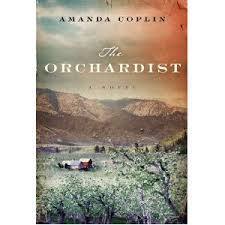
“Riding in the herd, the sound like one constant, endless sigh; some horses frantic and others calm, some remembering some wrong done to them while others wanted only to sleep, and each struggling with hunger and thirst; some horses pregnant, others desperate to copulate; and all moved forward as one body amid the heat and the dust. The men and Della spaced out and caught among them like ornaments in a blanket; like disparate thoughts fretting to cohere.”
Amanda Coplin, THE ORCHARDIST
THE ORCHARDIST by Amanda Coplin was published in 2012 and is 426 pages. I’ve heard many compelling reviews of the book, and bought it on the recommendation of bookseller, Jean Lewis. It is a sweeping historical drama set in the Pacific Northwest that reads like Steinbeck and haunts the reader long after the pages are closed.
The novel begins at the turn of the twentieth century on the remote land of William Talmage, a humble man who is largely alone on his orchard because of family losses and circumstance, but who is not entirely unhappy in his solitude. He has a friend at the market in town–a midwife and herbalist named Caroline, a mute Native American horse tamer named Clee who passes through during horse hunting season, and the painful memory of a sister he lost to the landscape years ago. It is upon the arrival of two feral, pregnant girls, however, that Talmage’s life is forever changed.
Decades pass in THE ORCHARDIST; seasons move over the land; the legacy of the inhabitants unfolds with fascinating and often painful clarity. Unspeakable tragedy punctuates the solace found in the tending of the trees; lives begin and end; and the young country grows with the story. Great truths and small beauties are revealed, but the power lies in the depth of the narrative. Coplin is a master–each section is meticulously crafted to reveal character through time and place, and the illustration of connection between the land and those who live on it is profound.
THE ORCHARDIST is a novel whose rich words burrow within the reader, pulling one into the story so deeply that the reader becomes one with it, a member of the tribe, a watcher enmeshed in the action. It is exhausting. THE ORCHARDIST cannot be devoured; it must be reflected upon and savored.
If you enjoy literary novels in historic settings, you must read THE ORCHARDIST. It will hypnotize, haunt, and challenge you. I give it my highest recommendation.
March 12, 2013
Book Review: THE CHALICE

“A gibbous moon hung above me tonight, swollen and bright in the sable sky, illuminating all the gravestones and memorials. But somehow it was a soft moon, not the sharply detailed orb I’d seen on other winter nights. It must be because we were near the sea. I’d been to Canterbury one other time–the same journey during which I learned of my destiny. Against my will, I was told of a prophecy. It was one I feared above all else. Yet here, tonight, I stood ready to fulfill it.”
Nancy Bilyeau, THE CHALICE
THE CHALICE, by Nancy Bilyeau, is the sequel to THE CROWN, and was published last week. I read and loved THE CROWN, so I have been eagerly awaiting this novel. Simon & Schuster kindly sent me a copy for review, which I will use in a giveaway. The spine is barely cracked because I read it in four nights.
In Reformation England, young novice Joanna Stafford is still reeling from the dissolution of her priory by her distant relation, King Henry the VIII. Used as a pawn by church and state alike, Joanna retires to the town of Dartford to begin a weaving business and try to live a quiet life, but it does not appear to be her destiny. Dragged into a new scandal and at the center of a conspiracy led by prophets and politicians, Joanna must hear the tellings of three seers to learn her ultimate role in the fate of Henry VIII’s monarchy.
Traveling through Europe and back, both taken against her will and led by her sense of duty, Joanna’s life becomes inextricably entwined in the fate of the kingdom, and only a tremendous act of courage can free her and decide the future.
Tudor England and the surrounding countries never cease to fascinate, and Bilyeau deftly weaves an original and riveting historical mystery. A varied and complex group of characters navigate an intricate plot rich in historical detail, fascinating politics, and forbidden love.
Bilyeau has a gift for animating a long-ago era without burdening the reader. Her characters are so layered that it’s hard to tell whom Joanna should trust, whom she should love, and which decisions will most fulfill her. It is this relentless tension that makes the story so engaging, and elevates it above genre suspense. Her characters will linger in the reader’s mind long after finishing the novel.
If you enjoy well-written, engaging historical suspense, I highly recommend THE CHALICE. It can be read alone or after reading THE CROWN, though I suggest diving into both in succession. For a chance to win THE CHALICE, please comment below and share the post.
For more on the novel, here is the book trailer. Enjoy!
https://www.youtube.com/watch?v=8oh3KzykQR0
March 2, 2013
Book Review: CALLING ME HOME
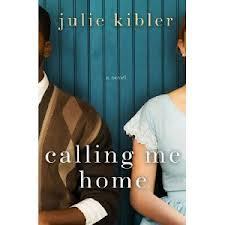
“The heart is a demanding tenant; it frequently makes a strong argument against common sense.”
Julie Kibler, CALLING ME HOME
CALLING ME HOME by Julie Kibler was published in February and is 336 pages. I purchased a copy because I am drawn to historical novels that explore cross-cultural relationships, and because Julie Kibler is a dear person. I can’t adequately tell you how much this book moved me.
Set in the present day and in the 1930s and 40s, CALLING ME HOME is the tragic story of a young woman from a white Kentucky family who falls in love with the black son of her family housekeeper. Raised almost side by side with Robert, Isabelle can’t help her feelings for this young man who saves her from a terrible situation, engages her intellectually, and stirs her heart. As much as he cautions her, he too falls in love, and they risk everything to be together.
In the present day and without much explanation, Isabelle asks her young black hairdresser to accompany her to a funeral in Cincinnati. Dorrie agrees, in spite of her own family troubles, and along the way Isabelle tells her ill-fated love story. At the funeral, secrets from the past are unearthed and affect all involved.
I thought I knew what happened in Isabelle’s past, and I was shaken and moved when all I’d predicted was not as it seemed. The family relationships in this novel run wider and deeper than blood, and themes of regret and loss are prevalent. In spite of the pain the reader will experience with these memorable characters, every step of the journey is well worth taking, and the messages of redemption resonate.
Fans of THE HELP will absolutely love this novel, and it would make a great book club selection. I wanted to talk to someone about character choices as soon as I finished, and this cast will linger with me long after I’ve closed the pages. I highly recommend CALLING ME HOME.


February 28, 2013
Book Trailers and Updates
When Penguin asked if I’d like to film a book trailer for HEMINGWAY’S GIRL, I eagerly accepted; first, because I’d have to go to Key West to film it, and second, because in our media-rich environment of social networking, I could see how a visual share could help promote a book.
Every aspect of that experience was a treat, so I was thrilled when Penguin offered to produce another book trailer for my forthcoming novel, CALL ME ZELDA. I again had the pleasure of working with the talented husband and wife team, David and Kathryn Seay, of David Seay Productions.
I am so pleased with the trailer, and I am delighted to present it to you. Please let me know what you think.
http://www.youtube.com/watch?v=2-J84D-dQyg
February 19, 2013
Author Interview: Amy Franklin-Willis
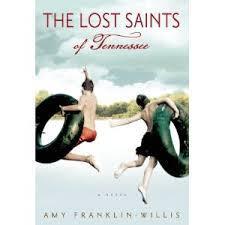
Amy Franklin-Willis, author of THE LOST SAINTS OF TENNESSEE, is in my writer “support group” Book Pregnant. Her novel was first released in February of 2012 and is now out in paperback from Grove/Atlantic. Amy was kind enough to answer my author questions, and her responses are engaging and heartfelt. I can’t wait to read THE LOST SAINTS OF TENNESSEE.
1. What inspired you to write your novel?
I’m an eighth generation Southerner and I think pieces of this story were probably transmitted at birth through my DNA. Some of my favorite stories as a child were the ones my father would tell about his growing up in tiny Pocahontas, Tennessee. He had an endless repertoire but my favorites were, in preferred order: the chimney & the radio antenna story, the assault with a deadly tomato story, and the Mrs. Leland’s Golden Butter Bits Comes to Town story. Modified versions of each of these show up in Lost Saints. From my child’s perspective, my father had a Huck Finn-like existence–traipsing through creeks, running wild through the woods, chasing down trains. This was very different from my own childhood in the 1970s and 1980s in a mid-size city in Oklahoma, where my mother and I moved when my parents separated.
Growing up, I spent every Christmas and a part of each summer back in Tennessee with my paternal grandmother in Pocahontas. There was no place in the world that felt more like home. She taught me how to make biscuits from scratch, how to maintain calm when twenty relatives have descended for Christmas dinner and the fridge breaks, and how to love people wholly and without judgment. She died when I was twenty-one and not long after that, her home was sold. No one in the immediate family lived in Pocahontas and the place felt like it was lost to me. In many ways, the book is a love letter to my grandmother—who inspired the character of Cousin Georgia—and to Pocahontas.
2. What is your favorite part of the writing process?
This is a great question. First drafts used to be my favorite. They are like falling in love for the first time—everything is new, you can’t wait to spend more time with the piece as it evolves, and you can’t see its flaws yet because you’re just trying so hard to get the story down. But now that I’ve completed three novels, I have to say I like the revision process almost as much as the first draft process. Revision is refine, refine, refine. Make it beautiful. Make it sing. Make it unputdownable. I spent eight years revising The Lost Saints of Tennessee and though I wished, many times, to be done with it, I kept discovering new things about my characters and the layers of the story.
3. If you could go back in time, what would you have told your unagented/unpublished writing self?
I would tell my twenty-something self that getting published will take longer than I ever thought it would. I spent ten years working on The Lost Saints of Tennessee. I would also tell that younger self that she should spend the first three years of learning to write a novel doing just that—writing the book, revising it, making it perfect, NOT trying to get it published.
4. What is your favorite novel of all time?
This is a completely unfair question since I could never pick one. As a child–Wizard of Oz series, Mary Poppins series, Wrinkle in Time, Mixed-up Files of Mrs. Basil E. Frankweiler; everything by Louisa May Alcott. As an adult—Pride & Prejudice, Sense and Sensibility, Wuthering Heights, Heart is a Lonely Hunter (Carson McCullers), Bastard Out of Carolina, Fried Green Tomatoes, Orlando, Their Eyes Were Watching God, Astrid and Veronika, The Horse Whisperer, Prodigal Summer, Absolutely True Diary of a Part-Time Indian.
I have three daughters—ages 14, 9, and 5 so I read a lot of wonderful children’s fiction and young adult fiction. On a typical evening, I might read a Madeleine book with my youngest, a chapter from Mrs. Frisby and the Rats of the NIMH with my fourth grader, and trade books in the Birthmarked series by Caragh O’Brien with my oldest .
5. What do you most want readers to take away from your novel?
Reading is, perhaps, the most individual of leisure activities. Each of us brings every experience we’ve ever had, every person we’ve ever known, to our understanding of each book we read. What I want most for my readers is what I wish for in my own reading—to have the “real” world fall away for the space of a few hours while discovering a new world peopled with characters both familiar and distinctly different from any I’ve met and propelled by a story that convinces me I must see it to the end. One of my favorite stories from a Lost Saints reader was from a woman in Connecticut who downloaded the e-book at the beginning of a freak snow storm and then spent the entire weekend of a power outage reading the book on her i-Phone, carefully timing her reading with battery re-charges on a generator. I was thrilled she felt the Cooper clan was worth all that trouble.
It certainly sounds like THE LOST SAINTS OF TENNESSEE is worth the trouble. For more on Amy and her novel, visit her website at http://www.amyfranklin-willis.com/.



